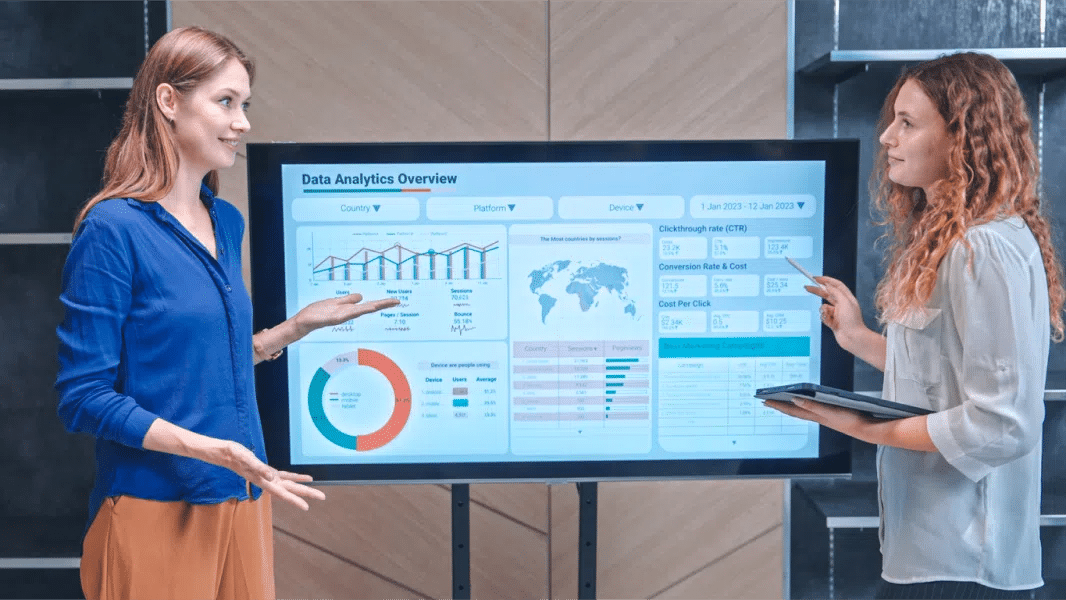The Total Guide to Workday ERP
Our guide covers everything you need to know about Workday ERP, including integration, market fit, pricing, features, and comparisons. Access our free e-book to learn more about automating accounts payable and global mass payments with Workday.
What is Workday ERP?
Workday ERP is a true cloud, unified SaaS software system for finance, human capital management (HCM), planning, professional services automation, project management, analytics, and business intelligence. ERP is enterprise resource planning, used for business processes and data transformation enterprise-wide without using separate functional system silos requiring duplicate data entry.
Workday is a cloud-based platform that brands itself as an Enterprise Management Cloud rather than a traditional ERP system. It doesn’t offer an on-premises version. Most Workday cloud ERP solution customers are mid-size and large companies and organizations. Workday is a top-tier ERP system that competes with SAP and Oracle.
Workday ERP system products include:
- Enterprise planning
- Financial management
- Spend management
- Analytics and reporting
- Human capital management (HCM)
- Talent management
- Payroll and workforce management
- Professional services automation (PSA)
- Student
- Platform and Product Extensions (PPE).
Features
Key Features and Benefits of Workday
The ERP Workday provides the following features and benefits. Workday has seamless integration with third-party software to increase its functionality.
Multi-entity
Workday ERP is multi-entity software for growing multinational businesses and organizations that handles complex business operations.

True Cloud Software
Workday ERP software is true cloud with a modern user interface and features that you can access 24/7 anywhere, including from your home, using computers and mobile apps. True cloud is user-friendly.

Strong Planning and Budgeting
Enterprise planning includes Workday Adaptive Planning software (from the Adaptive Insights acquisition), one of today’s most robust financial planning, workforce planning, operational planning, and close & consolidation solutions.

Human Capital Management (HCM)
Workday Human Capital Management (HCM) software is a comprehensive human resource information system (HRIS) product.
Workday Platform and Product Extensions
Workday Platform and Product Extensions (PPE) is a product for app software development and integrations.

Salesforce CRM Partner
Workday has a strategic partnership with Salesforce to integrate its customer relationship management (CRM) software with Workday, using an add-on from the Salesforce AppExchange. Workday doesn’t have a CRM. Salesforce is the leading CRM product.
Workday Enterprise Planning includes financial, workforce, sales planning, and real-time analytics for the entire business enterprise. Workday Financial Management provides accounting and reporting. Workday HCM has human resource management and employee experience. Workday PSA includes project management, expenses, time tracking, and project billing.
For Workday Human Capital Management, machine learning driven skills assessment evaluates skills needed in the future for new talent and by existing employees. It suggests new knowledge to pursue in workforce planning. Augmented people analytics provides insights for business intelligence and decision-making. Workday HCM automates tasks, starting with recruiting.
Financial planning and budgeting with Workday Adaptive Planning results in better financial management. Workday Adaptive Planning has informative real-time dashboards for tracking and managing performance and includes predictive forecasting using AI and machine learning.
Workday Adaptive Planning earned a Gartner Peer Insights Customers’ Choice 2024 award. The strategic partnership with Microsoft combines the functionality of Microsoft Azure cloud and Microsoft Teams with Workday Adaptive Planning, Workday Financial Management, and Workday Human Capital Management to improve system capabilities, communication, and collaboration.
Workday Student is software for student recruiting, admissions, financial aid, and administration of higher education institutions, including for-profit enterprises.
Modules
Workday Modules
The list of Workday ERP modules is extensive, including these key modular apps. Workday can be improved by integrating third-party add-ons, including Tipalti’s unified finance automation products and Salesforce CRM.

Financial Management
Workday Financial Management includes multiple modules that handle recording accounting transactions, accounts receivable, accounts payable, cash management, asset management, audit and controls, contracts, financial reporting & analysis, global close & consolidation, multi-GAAP, multi-book, multi-chart of accounts, and revenue management.
Financial Planning
Workday Financial Planning is continuous planning software for budgeting and forecasting with rolling, AI-driven forecasts, variance analysis, scenario modeling, revenue planning, and financial and management reporting. It can be used for strategic and long-range planning as part of FP&A. Financial Planning is one of the Workday Adaptive Planning products.


Close and Consolidation
Workday Close and Consolidation is part of Workday Adaptive Planning. It automates consolidation tasks like eliminations and translation without batch processing. It uses integrated data from different sources with functional and reporting currencies for real-time financial reporting. Workday Close and Consolidation provides continuous anomaly detection and an audit trail.
Workflow Planning
Workflow Planning is one product within Workday Adaptive Planning software that’s used for HCM, finance, and operations. Workflow Planning features include headcount and costs that links to financial models, workforce capacity planning, multi-scenario talent planning, and strategic workflow planning.


Operational Planning
Operational Planning is another Workday Adaptive Planning product. Operational planning is used for sales planning, demand and supply planning, and project planning. Operational planning enables collaborative multi-functional planning and linking models across HR, finance, sales, IT, and operations teams, as well as better stakeholder visibility.
Contract Intelligence and Contract Lifecycle Management
The Workday Contract Intelligence product uses AI and a contract repository to understand legal contracts entered into by your business. It includes advanced search and customizable dashboards.
Contract Lifecycle Management automates contract drafting and negotiations with AI and manages contract obligations. It uses a clause library, contract templates, and automated contract redlining.


Industry Operations
Products within the Workday Industry Operations classification include Professional Services Automation, Supply Chain Management for Healthcare, and Student Management. These are industry-specialized products.
Human Resources (HR)
Workday offers an extensive array of HR products. These products include Human Capital Management (HCM), Human Resource Management (HRM), Employee Experience, Employee Voice, Workforce Management, Talent Management, Analytics & Reporting, Vendor Management System, Workforce Planning, and Local and Global Payroll. Its cloud-based ERP human resources products can be used for employee performance management.


Artificial Intelligence
Workday offers the Agent System of Record to bring Agentic AI from all sources into one platform for better Agentic AI management. Workday uses responsible AI with Illuminate gives visibility into AI and provides complete control over your data.
Industries
Industries Using Workday
Workday ERP fits midsize and large businesses and organizations in the following industries.

Manufacturing companies

Distribution companies

Retailers, including online eCommerce and brick-and-mortar businesses

Companies with field service operations

R&D companies

Service companies

Marketing companies

Training companies

Consultants and Workday Partners

IT companies with trained developers

Accounting firms and financial services

Healthcare

Education (universities and K-12)

Hospitality

Energy and resources

Government entities

Nonprofits
Implementation
How to Implement and Use Workday
Establish an internal team and choose your Workday partners early. Set implementation plans, complete training, migrate your data, and test thoroughly before going live. After deployment, evaluate what worked and where improvements are needed.Workday provides a structured implementation guide that includes using both a technology partner and a certified services deployment partner. Their Delivery Assurance program offers a roadmap for success. Workday also offers pre-configured launch packages, ongoing ERP training (either directly or via a partner), and access to peer user groups for continued support.

Step 1
Team
Establish a multifunctional internal team and a leader responsible for the Workday implementation. Get CEO and executive management support for the Workday implementation as a change management initiative, starting with an all-employee meeting.

Step 2
Workday Partner Selection
Select a technology partner and Workday Services deployment partner with extensive Workday experience and a history of successful implementation.

Step 3
Planning, Goal Setting, and Collaboration
Use the Workday Partners to help team members use a roadmap for the Workday ERP implementation, set goals, milestones, deadlines, and task assignments. Collaborate as a team.

Step 4
Training
Extensively train implementation team members and system users. Include hands-on training for each role. Participate in Workday Users Group meetings and training.

Step 5
Data migration, Testing, and Going Live
Clean and migrate data from the prior system, map fields, use a sandbox testing environment, run in parallel, then go live with the new Workday ERP system.
Step 6
Post-Implementation Review
Get Workday implementation feedback from team members and users, including suggestions to improve future software implementations.
How Does AP Automation Software Integration Work With Workday?
Workday ERP integration with third-party add-ons is either a flat file or an API connection. Tipalti’s finance automation products, including AP automation and mass payments, use flat-file integration with Workday software to automate the entire payables cycle and make global mass payments, starting with self-service supplier onboarding to reduce business workloads and fraud risks. Use the SaaS Tipalti add-on through the Workday login.
Tipalti AP automation software streamlines workflows, digitally transforms, and automates end-to-end payables processes. With Workday, Tipalti functions as a scalable, real-time, multi-entity software. Your business can process invoices quickly to take early payment discounts that reduce purchase costs. Tipalti AP automation reduces payables processing time by 80% to lower operating costs, reduces errors by 66%, lessens fraud risks, and accelerates the accounting close by 25%. Tipalti will help your business minimize hiring needs through less manual accounts payable processing time. Tipalti can be extended to Procurement with the Tipalti Procurement product.
Tipalti AP automation cloud software functionality includes:
- Self-service supplier onboarding through a Supplier Hub and supplier validation using TIN matching
- Collection of W-9 or W-8 tax forms before the first payment
- Selection of preferred payment method
- Providing contact and payment method information
- AI-driven digital OCR invoice capture by headings and line items in 145+ languages
- Automated invoice processing
- 3-way matching or 2-way matching with purchase order and receiving data
- Automated account coding with Tipalti AI℠
- Application of 26,000+ automated payment rules to detect discrepancies
- Automatic approval routings
- Automated global regulatory compliance
- Global payments to 196 countries in 120 currencies, with a choice of 50+ payment methods
- Automated payment status communication for suppliers through the Supplier Hub and email
- Views of cash requirements for large batch payments
- Automatic syncing with Workday subledgers
- Instant payment reconciliation for multi-payment methods, multicurrency batches
- Real-time spend visibility
- Spend queries using Ask Tipalti AI℠ for business intelligence and informed decision-making
- Simple tax compliance preparation reports for 1099s and 1042-S forms, or optional eFiling of 1099-MISC and 1099-NEC forms with partnered Tax1099 Software from Zenwork

Other cloud Tipalti finance automation products include mass payments for payouts, expenses for submitting and reimbursing employee expense claims, advanced FX solutions, and Procurement. Tipalti Procurement simplifies employee purchase requisitions intake and approvals and automatically creates purchase orders from approved PRs. Tipalti also offers approved users the Tipalti Card, a corporate spending card for employee spend management.
How Much Does Workday Cost?
Workday ERP pricing to meet custom business needs includes the per-user SaaS subscription cost for the selected Workday ERP and other software products, including Workday and third-party add-ons, preconfigured packages for launch, Workday training courses, and Workday partners’ consulting services costs. Costs also include any extra internal IT and other staffing required during implementation.
Recommendations
